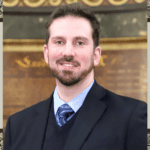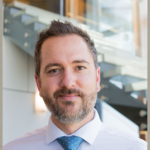
With The Apostles’ Creed by Ben Myers releasing tomorrow (May 9), Bible Study Magazine sat down with Ben to discuss his interest in the creed, the importance of church history, and how Christians can benefit from these today. Look for this article and many others of interest in the July/August issue.
The church is founded on ancient biblical teachings and practices like the Ten Commandments, baptism, the Apostles? Creed, the Lord?s Supper, the Lord?s Prayer, and corporate worship. These basics of the Christian life have sustained and nurtured every generation of the faithful, from the apostles to today.
For centuries, new believers have been introduced to the church?s teachings through the Apostles? Creed, and veteran Christians regularly recite this statement of faith to affirm their beliefs. In The Apostles? Creed: A Guide to the Ancient Catechism, Ben Myers concisely explains the creed with the help and insights of the early church. We asked Ben to tell us what he?s learned about the creed and its implications for Bible study.
Bible Study Magazine: In this book you were most interested in explaining how the early church understood the creed. How did you become interested in the life and works of the early church?
Ben Myers: The first theological book I ever read was Augustine?s Confessions. I was a university student and I wandered into a bookstore and bought this cheap paperback and went home and read it. I had never even heard of Augustine. I had no idea that ancient Christians wrote books about their faith! That book set my life on a new path. It challenged me to ask questions and to think deeply about my faith. Nobody had ever encouraged me to do that before. It freed my mind.
Many years later, as a teacher of theology, I got my students to read Augustine?s Confessions and other early Christian writings. And I saw again how liberating it is when people start to ask questions and to glimpse their own assumptions about faith from the perspective of the ancient church.
BSM: What part of the creed does the modern church need most?
Myers: Today we tend to think of salvation in moral and legal terms: We have committed certain transgressions, we deserve to be penalized, we need forgiveness. The ancient Christians understood it quite differently. In their view, the deepest problem isn?t moral or legal, but concerns the whole direction of our lives. We?re gravitating toward death, and we need a total reorientation so that our lives start moving toward God.
When you think about it like this, you no longer see salvation as a one-off event?yesterday I was guilty, today I am forgiven. You start to see it as a lifelong process of growth and transformation ?from glory to glory.?
BSM: What key lessons do the church fathers model for Bible teachers today?
Myers: In a third-century sermon on the book of Joshua, Origen pauses in reverence when he finds the word ?Jesus? for the first time in the Bible. (In Greek, ?Jesus? and ?Joshua? are the same name.) The book of Joshua, he says, isn?t just about the history of Israel. It is about ?the mysteries of Jesus my Lord.?
The early Christian teachers loved the Old Testament because they believed it was a revelation of Christ. They read it with amazing spiritual fervor, expecting everywhere to find Jesus peeking through between the lines of the text. Today we tend to approach the Old Testament with a coldness and a lack of expectancy that would have seemed like heresy to our forefathers.
BSM: How does the creed help or influence your Bible reading and Bible teaching?
Myers: The creed doesn?t spell out the details of what you?ll find in the Bible. But it tells you what to look for. It reminds you that you?re looking for a unified witness to one God, creator, redeemer, and sanctifier. It reminds you that the message of the Old Testament can?t be separated from the message of the New. It reminds you that the Bible is the story of God?and just as there is only one God, so there is one story pulsating through the scriptural writings.
Of course, we could figure this out without the creed. In that sense, the creed is not essential. But Christians have often gone astray in their reading of the Bible, and the creed has been a patient, faithful signpost that points the way back to the right path.
BSM: You?re an advocate of reading ancient sources directly, rather than just reading about them. Why? What advice and encouragement would you give to lay folks?
Myers: The main reason to prefer the primary sources is that they?re more enjoyable. A book about Augustine might be tedious and hard-going. But generations of Christians have read Augustine?s Confessions and have experienced for themselves the white-hot faith and disarming frankness of this ancient pastor. Those personal qualities can never be conveyed second-hand.
Origen?s touching personal devotion to Jesus (?my Jesus,? as he often calls him) can never really be conveyed in a textbook. But when you read Origen?s sermons and commentaries you see it everywhere. He studies the biblical text as an act of love and devotion, in the spirit of someone who drinks in the words of a love letter. There is a spiritual depth in these ancient authors that you can discover for yourself by reading their works first-hand.
Learn more about The Apostles’ Creed, part of the new Christian Essentials series.
“I am very thankful to Ben Myers for his concise, readable commentary on the Apostles? Creed! He joins the refreshing movement that is retrieving the church?s long and well-established theological consensus and urging the contemporary church to embrace this wisdom from the past. His book helps today?s church confess the Apostles? Creed as essential truth about the triune God and the salvation he offers.”
?Gregg R. Allison, Professor of Christian Theology, The Southern Baptist Theological Seminary, author of Historical Theology: An Introduction to Christian Doctrine




